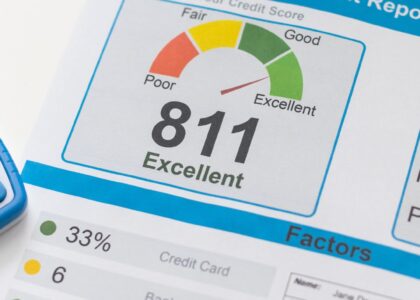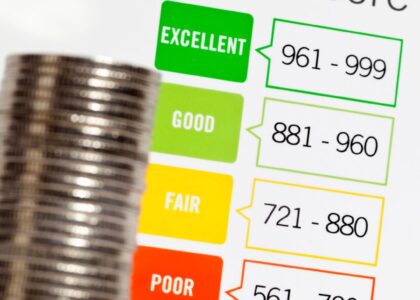Understanding the Basics of Credit Scores
Your credit score serves as a numerical representation of your creditworthiness, influencing your ability to secure loans, obtain favorable interest rates, and even qualify for rental agreements or employment opportunities. At its core, it reflects how responsibly you manage your financial obligations.
What is a Credit Score?
A credit score is a three-digit number calculated based on various factors from your credit report, which summarizes your credit history. This number typically ranges from 300 to 850, with higher scores indicating better creditworthiness. Credit scores are used by lenders, landlords, insurance companies, and even potential employers to evaluate your financial trustworthiness and assess the risk of extending credit or entering into financial agreements with you.
Components of a Credit Score:
- Credit Report: Your credit report contains a detailed record of your credit history, including information about your credit accounts, payment history, outstanding debts, and inquiries.
- Credit History: This refers to your track record of managing credit accounts over time. A longer credit history generally indicates greater experience with credit and can positively influence your credit score.
- Credit Utilization Ratio: This ratio reflects the amount of credit you’re currently using compared to your total available credit limits. Keeping this ratio low, ideally below 30%, demonstrates responsible credit management and can boost your credit score.
- Payment History: Timely payments on credit accounts are crucial for maintaining a positive credit score. Missing payments or making late payments can significantly harm your score.
- Types of Credit: Having a diverse mix of credit accounts, such as credit cards, loans, and mortgages, can demonstrate your ability to manage various types of credit responsibly, which can positively impact your credit score.
Significance of a Credit Score:
Your credit score plays a pivotal role in determining your financial opportunities and stability. It can affect your ability to secure loans for major purchases such as homes or cars, obtain credit cards with favorable terms, and even qualify for rental housing or utility services. A higher credit score not only opens doors to better financial opportunities but also enables you to access credit at lower interest rates, potentially saving you thousands of dollars in interest payments over time.
How Credit Repair Bay Area Can Help:
At Credit Repair Bay Area, we understand the complexities of credit scores and are committed to helping individuals navigate the credit repair process with confidence. Our team of experts specializes in analyzing credit reports, identifying inaccuracies or errors, and implementing tailored strategies to improve credit scores. Whether you’re looking to dispute errors on your credit report, reduce credit card balances, or establish a solid credit history, we provide personalized solutions designed to help you achieve your financial goals.
Strategies for Rapid Credit Score Improvement
When it comes to improving your credit score swiftly, employing strategic tactics can make a significant difference. At Credit Repair Bay Area, we’ve honed proven methods to help our clients achieve rapid credit score enhancement. Here are some actionable strategies you can implement:
Paying Bills on Time:
One of the most impactful ways to boost your credit score is by ensuring timely payments on all your credit accounts. Late payments can have a detrimental effect on your score, so prioritizing on-time payments is essential.
Reducing Credit Card Balances:
Another effective strategy is to lower your credit card balances. Aim to keep your credit utilization ratio—the amount of credit you’re using compared to your total available credit—below 30%. By reducing your balances, you demonstrate responsible credit management, which can positively impact your credit score.
Checking Your Credit Report:
Regularly monitoring your credit report is crucial for identifying any errors or inaccuracies that may be dragging down your credit score. Disputing and rectifying such discrepancies can lead to a quick improvement in your score.
Becoming an Authorized User:
Consider becoming an authorized user on someone else’s credit card account, particularly if the primary account holder has a strong credit history. Being associated with an account in good standing can provide a boost to your credit score.
Addressing The Question: “How Can I Raise My Credit Score In 30 Days?”
If you’re on a tight timeline to improve your credit score, focus on actions that yield quick results:
- Dispute errors on your credit report promptly to rectify inaccuracies.
- Pay down credit card balances aggressively to lower your credit utilization ratio.
- Explore the option of becoming an authorized user on a trusted individual’s account.
- Avoid opening new credit accounts, as this can temporarily lower your score due to inquiries and reduced average account age.
Implementing these strategies diligently can lead to noticeable improvements in your credit score within a relatively short period.
Addressing The Question: “How Can I Raise My Credit Score In 30 Days?”
If you’re on a tight timeline to improve your credit score, focus on actions that yield quick results:
- Dispute errors on your credit report promptly to rectify inaccuracies.
- Pay down credit card balances aggressively to lower your credit utilization ratio.
- Explore the option of becoming an authorized user on a trusted individual’s account.
- Avoid opening new credit accounts, as this can temporarily lower your score due to inquiries and reduced average account age.
Implementing these strategies diligently can lead to noticeable improvements in your credit score within a relatively short period.
Setting Specific Credit Score Goals
Setting specific credit score goals can provide you with a clear roadmap for improving your credit and achieving financial stability. Whether you’re aiming for a specific score or looking to reach a certain milestone within a set timeframe, having a target in mind can help guide your actions. Here’s how you can set and work towards your credit score goals:
How to Get a 720 Credit Score in 6 Months:
If your goal is to achieve a 720 credit score within six months, here are some actionable steps you can take:
- Pay Off Outstanding Debts: Start by paying off any outstanding debts to reduce your overall debt burden and improve your credit utilization ratio.
- Use Credit Cards Responsibly: Use credit cards responsibly by keeping balances low and paying them off in full each month. Avoid carrying high balances, as this can negatively impact your credit score.
- Maintain Good Payment Habits: Make on-time payments on all your credit accounts to demonstrate your creditworthiness and improve your payment history.
- Monitor Your Progress: Regularly monitor your credit score and credit report to track your progress and identify areas for improvement. Take proactive steps to address any issues that may arise.
By following these steps diligently and staying focused on your goal, you can work towards achieving a 720 credit score within the specified timeframe.
Is a 650 a Good Credit Score?
While a credit score of 650 falls within the fair to good range, there is still room for improvement. If your current score is 650, consider taking steps to enhance your credit profile and achieve a higher score. At Credit Repair Bay Area, we can help you identify areas for improvement and develop a personalized strategy to reach your desired credit score.
How Rare is a 720 Credit Score?
While a credit score of 720 is relatively common, it still represents a strong credit profile and demonstrates responsible credit management. By achieving a 720 credit score, you position yourself as a low-risk borrower in the eyes of lenders, which can open up access to better financial opportunities and lower interest rates.
Setting specific credit score goals and taking proactive steps to achieve them can empower you to take control of your financial future and achieve your long-term objectives.
Evaluating Credit Score Ranges
Understanding the implications of different credit score ranges can help you gauge your financial standing and make informed decisions about credit-related matters. Let’s explore the significance of various credit score ranges:
Credit scores typically range from 300 to 850, with higher scores indicating better creditworthiness. Here’s a breakdown of the common credit score ranges:
- 300 – 579: Poor: Credit scores in this range are considered poor and may indicate a history of missed payments, defaults, or other credit issues. Individuals with scores in this range may struggle to qualify for credit products or may face high interest rates and fees if they are approved.
- 580 – 669: Fair: Credit scores in this range are considered fair and may indicate some credit challenges. While individuals with scores in this range may still qualify for credit products, they may face higher interest rates and stricter lending criteria compared to those with higher scores.
- 670 – 739: Good: Credit scores in this range are considered good and indicate a relatively strong credit profile. Individuals with scores in this range are likely to qualify for credit products with favorable terms and may enjoy lower interest rates.
- 740 – 799: Very Good: Credit scores in this range are considered very good and reflect a high level of creditworthiness. Individuals with scores in this range typically qualify for credit products with excellent terms and may receive preferential treatment from lenders.
- 800 – 850: Excellent: Credit scores in this range are considered excellent and represent the highest level of creditworthiness. Individuals with scores in this range are highly likely to qualify for the best credit products and may receive the most favorable terms and rates.
Is a 650 a Good Credit Score?
A credit score of 650 falls within the fair to good range. While it’s not considered excellent, it’s also not poor. Individuals with scores in this range may still qualify for credit products, but they may face higher interest rates and stricter lending criteria compared to those with higher scores.
Implications of a 650 Credit Score:
If your credit score is 650, there’s room for improvement. By taking steps to enhance your credit profile, such as making on-time payments, reducing credit card balances, and disputing errors on your credit report, you can work towards achieving a higher score and qualifying for better credit products and terms.
Understanding where your credit score falls within the various ranges can help you assess your financial health and make informed decisions about credit management and borrowing.
Understanding the Rarity of High Credit Scores
While credit scores range from 300 to 850, not all scores are equally common. Understanding the distribution of credit scores can provide valuable insights into your credit standing and help you gauge where you fall relative to others. Let’s delve into the rarity of high credit scores:
Credit scores are distributed across the population, with varying frequencies at different score levels. While the exact distribution may vary, certain patterns are generally observed:
- Low Scores: Scores below 600 are less common and may indicate credit challenges or issues. Individuals with low scores may face difficulties in obtaining credit or may be offered credit products with less favorable terms.
- Mid-Range Scores: Scores in the mid-range, such as 600 to 700, are more common and represent a broader segment of the population. These scores may indicate varying degrees of creditworthiness, with some individuals having stronger credit profiles than others.
- High Scores: Scores above 700, particularly in the 720 to 850 range, are relatively less common but still represent a significant portion of the population. These scores reflect strong credit profiles and responsible credit management.
Frequency of a 720 Credit Score:
While exact statistics may vary, a credit score of 720 is considered relatively common among individuals with strong credit profiles. Achieving a score of 720 or higher demonstrates a high level of creditworthiness and positions you favorably in the eyes of lenders.
Implications of a 720 Credit Score:
Having a credit score of 720 or higher opens up access to better financial opportunities and may qualify you for credit products with excellent terms and rates. With a 720 credit score, you’re considered a low-risk borrower, which can translate into lower interest rates, higher credit limits, and greater flexibility in borrowing.
Understanding the distribution of credit scores and the prevalence of high scores can provide context for your own credit standing and help you set realistic goals for credit improvement.
Leveraging Credit Repair Bay Area for Your Credit Improvement Journey
Now that you understand the intricacies of credit scores and the strategies for improvement, it’s time to take action with the help of Credit Repair Bay Area. Here’s how our expertise can benefit you:
Personalized Approach: At Credit Repair Bay Area, we recognize that every individual’s credit situation is unique. That’s why we offer personalized solutions tailored to your specific needs and goals. Whether you’re dealing with errors on your credit report, struggling with high debt balances, or aiming to boost your credit score quickly, our team of experts is here to guide you every step of the way.
Comprehensive Credit Analysis: We start by conducting a thorough analysis of your credit report to identify any inaccuracies, discrepancies, or areas for improvement. By scrutinizing every detail of your credit history, we can develop a targeted strategy to address negative items and enhance your overall credit profile.
Proven Strategies: With over 19 years of experience in the credit repair industry, we’ve honed proven strategies that deliver results. From disputing errors with credit bureaus to negotiating with creditors on your behalf, we leverage our expertise and industry knowledge to maximize your chances of success.
Cutting-Edge Technology: We utilize the latest cutting-edge technology, processes, and programs to streamline the credit repair process and ensure optimal efficiency. Our advanced tools enable us to track progress, communicate with clients, and monitor changes to your credit report in real-time, keeping you informed every step of the way.
Dedicated Support: Throughout your credit improvement journey, you’ll have access to dedicated support from our team of credit experts. Whether you have questions, concerns, or need guidance on financial matters, we’re here to provide personalized assistance and support to help you achieve your goals.
Results-Driven Approach: Our ultimate goal is to help you achieve lasting results and regain financial peace of mind. Whether you’re looking to qualify for a mortgage, secure a car loan, or simply improve your credit score for future financial opportunities, we’re committed to helping you succeed.
Get Started Today: Don’t let credit challenges hold you back. Take the first step towards a brighter financial future by contacting Credit Repair Bay Area today. With our expertise and dedication, we’ll help you navigate the credit repair process with confidence and achieve the credit score you deserve.
Taking Control of Your Financial Future
As you’ve learned throughout this article, your credit score is a crucial aspect of your financial well-being, impacting your ability to access credit, secure favorable loan terms, and achieve your long-term financial goals. By understanding the factors that influence your credit score and implementing strategic actions to improve it, you can take control of your financial future and unlock new opportunities.
At Credit Repair Bay Area, we’re dedicated to helping individuals like you navigate the complexities of credit repair and achieve tangible results. Whether you’re looking to dispute errors on your credit report, reduce debt balances, or boost your credit score quickly, our team of experts is here to support you every step of the way.
Remember, improving your credit score is a journey that requires patience, perseverance, and commitment. By setting specific goals, implementing proven strategies, and leveraging the expertise of Credit Repair Bay Area, you can overcome credit challenges and pave the way for a brighter financial future.
So don’t wait any longer—take action today to begin your credit improvement journey. Contact Credit Repair Bay Area to schedule a consultation and discover how we can help you achieve the credit score you deserve. Together, we’ll work towards your financial goals and empower you to build a solid foundation for success.




